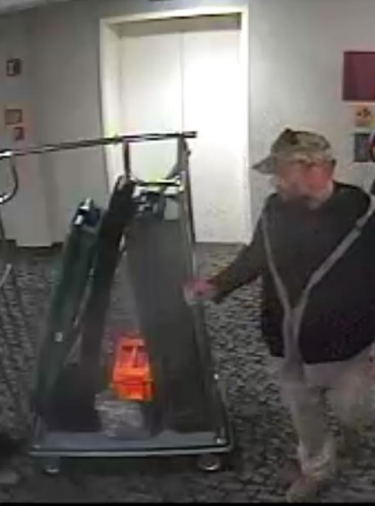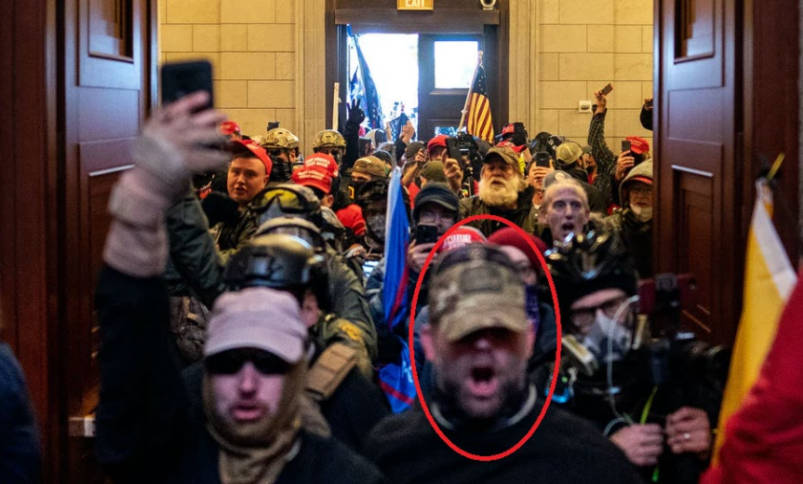Prosecutors on Monday revealed what they said was a suspected effort by Oath Keepers to stash weapons in Virginia ahead of the Jan. 6 attack on Congress.
The so-called “Quick Reaction Force” — a spoken-of group of armed Oath Keepers waiting for their command to join the fight — has been mentioned before by prosecutors in the cases of several Oath Keepers charged with conspiring to disrupt the certification of Electoral College votes on Jan. 6.
Defense attorneys have argued that there is little evidence the QRF existed, beyond text message chatter between the Oath Keeper defendants ahead of Jan. 6.
But Monday’s filing from the government, advocating for the continued detention of Oath Keeper Kenneth Harrelson (circled in red, above), argued explicitly that “the evidence suggests that Defendant Harrelson was both aware of the presence of an armed Quick Reaction Force and likely contributed weapons to it.”
Prosecutors referred first to a Dec. 30 message between co-defendants Thomas Caldwell and Jessica Watkins, in which Caldwell referred to someone that prosecutors call “Person Three” and allegedly said, “As we speak he is trying to book a room at Comfort Inn Ballston/Arlington because of its close-in location and easy access to downtown because he feels 1) he’s too broken down to be on the ground all day and 2) he is committed to being the quick reaction force anf [sic] bringing the tools if something goes to hell.”
“That way the boys don’t have to try and schlep weps on the bus. He’ll bring them in his truck the day before,” Caldwell allegedly added, apparently referring to weapons.
Prosecutors say Person Three stayed at the Comfort Inn in Ballston, Virginia — where gun laws are more lax than in D.C. — and that co-defendant Kelly Meggs paid for two other rooms at the same hotel in Person Three’s name.
On Jan. 5, Harrelson allegedly asked in a group chat, “We get that QRF hotel address yet?” to which Meggs responded “Dm,” — a reference to using a direct message, rather than discussing the matter with the entire group.
Three hours later, according to prosecutors, Harrelson arrived “in the area” of the Comfort Inn Ballston, where he allegedly remained for roughly an hour before returning to Washington, D.C.
“It is reasonable to believe that during this hour, Defendant Harrelson was dropping his weapons with Person Three and the QRF,” the government alleged.
The day after the attack, on Jan. 7, Harrelson again messaged the group chat, “So we’re just leaving DC and I would like to know where my shits at since it seems everyone’s gone already.”
Another member of the chat responded, “Did you leave it at Comfort Inn in that room?”
About twenty minutes later, Harrelson was allegedly at that hotel. Prosecutors shared a surveillance camera still which they said showed him “rolling what appears to be at least one rifle case down a hallway and towards the elevator.”

“In other words, it is reasonable that Defendant Harrelson dropped his weapons off with the QRF at the Comfort Inn Ballston on January 5, and then retrieved those weapons on the morning of January 7 as he left the Washington, D.C., area,” the filing alleged.
Harrelson will appear in court Wednesday morning for a detention hearing. He’s been indicted by a federal grand jury on charges of conspiracy, obstruction of an official proceeding, destruction of government property, and entering and remaining in a restricting building or grounds.
He, Meggs and other Oath Keepers have maintained their innocence.
Aside from the discussion of the QRF and Harrelson’s purported weapons, prosecutors in their filing Monday noted Harrelson’s extensive alleged involvement in meetings with fellow Oath Keepers in the run-up to the attack, his alleged deletion of materials off of his phone after the attack, and warning signs that Harrelson may have sought to evade detection following the attack — such as the book “Eluding Pursuers and Evading Capture” that FBI agents said they found in a gun safe of his in March.
They also allege that Harrelson lied during a detention hearing, falsely claiming that he did not take any video while in the Capitol.
For his part, Harrelson’s attorneys argued in a court filing that “The government has produced no evidence that Mr. Harrelson damaged any property or that he committed any act of violence,” and that “the government has produced no evidence that Mr. Harrelson’s alleged conduct was calculated to influence the conduct of government, as is also required for the presumption in favor of detention to apply to him.”



